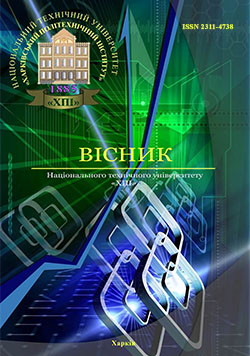VALUES-ORIENTED PROJECT MANAGEMENT OF RENEWABLE ENERGY
DOI:
https://doi.org/10.20998/2413-3000.2017.1224.12Keywords:
alternative energy, project management, evaluation values, stakeholders, lifetime risksAbstract
The value-oriented approach to project management of renewable energy based on classification stage of the life cycle of products of the projects, adapted to the goals and objectives of information modeling, which allowed to formulate stricter requirements information models used at different stages of the power plant is proposed. A classification of the alternative energy projects, which highlighting areas for activities is proposed. The list of stakeholders that have an impact on alternative energy projects and presented their classification is defined. The value of alternative energy projects considered from the standpoint of a utilitarian approach, using the concept of utility and on the basis of this concept proposed classification values of alternative energy projects. Criteria values as indicators for assessing the value of alternative energy projects and their weights determined by pairwise comparison. To take into account the changes of the value criteria over time proposed to use the key control points value, assessed value criteria in various key points of control, defined indicator of the total value of alternative energy projects. The classification of risks and tools for value-oriented risk management in alternative energy projects is proposed. Further study authors plan to link the development of mechanisms for harmonization value alternative energy projects for their stakeholders.
References
Maljarenko V. A., Nemirovskij I. A. Jenergosberezhenie i jenergeticheskij audit [Energy saving and energy audit.]. Kharkov, KNAME, 2008. 253 p.
Sibikin Ju. D., Sibikin M. Ju. Netradicionnye i vozobnovljaemye istochniki jenergii [Non-traditional and renewable energy]. Moscow, KNORUS, 2010. 232 p.
Vidy jelektrojenergetiki Novosti jenergetiki [Types of Electricity Energy News] Available at: http://novostienergetiki.ru/vidy-elektroenergetiki/ (accessed 14.12.2016).
Gibilisko S. Al'ternativnaja jenergetika bez tajn [Alternative energy without secrets lane]. Moscow, Eksmo, 2010. 368 p.
Klejner G. B. Sistemnaja paradigma i sistemnyj menedzhment [Systemic paradigm and system management]. Ros. Zh. management. 2008, vol. 6. No 3.
Friedman A., Miles S. Stakeholders: Theory and Practice. Oxford, Oxford University Press, 2006.
Donalson T., Preston L. E. The Stakeholer Theory of the Corporation: Concepts, Evience, Implications. Acaemy of Management Review. 1995, Vol. 20, no. 1. doi.org/10.2307/258887
National Building Information Modeling Standard. Version . Part 1: Overview, Principles, and Methodology. National Institute of building sciences, 2007. 183 p.
PAS 1192-3:2014, incorporating corrigendum No.1. Specification for information management for the operational phase of assets using uilding information modelling. BSI Standards, 2013. 44 p. doi: 10.3403/30287898
Newbould G., Luffman G. Successful Business Politics. Gower, London, 1989.
Post J. E., Preston L. E., Sachs S. Redefining the Corporation: Stakeholder Management and Organizational Wealth. Stanford: CA, Stanford University Press, 2002.
Borisova N. Research alternative energy project risks using cognitive modeling method Proceedings of the VI International Scientific and Practical Conference Science in the modern information society VI. North Charleston, USA, 2015, vol. 3. 242.
Grigorjan T. G. Upravlenie cennost'ju v IT-proektah. Ponjatija i koncepcii [Value management in IT projects. Terms and .concepts] Coll. Science. pr. NUS. Mykolaiv, 2015, no. 3, pp. 113–119.
Gupta Namita Project Management Life Cycle-Iterative & Adaptive. 2014. Available at: http://www.izenbridge.com/blog/project-management-life-cycle-iterative-adaptive/ (accessed 10.12.2016).
Desaulniers Douglas H.; Anderson Robert J. Matching Software Development Life Cycles to the Project Environment. Proceedings of the Project Management Institute Annual Seminars & Symposium. Nashville, TN. Newtown Square, PA: Project Management Institute, 2001.
Russell A., Di Filippo I., Di Filippo D. The Six Phase Comprehensive Project Life Cycle Model Includes the Project Incubation-Feasibility Phase and the Post-Project Evaluation Phase. PM World Journal. 2012.
Semko I. B. Klasyfikatsiya ryzykiv portfeliv proektiv [Classification of risk portfolios of projects] II Ukrainian nauk. and practical. Conf. undergraduates, graduate students and scholars "Project management in conditions of transitive economy". Odessa: ODABA, 2011, vol. 1, pp.96–99.
Danchenko O. B. Borisova N. Metody upravlinnya ryzykamy PAE [Methods of risk management PAE] Proceedings of the National Technical University "KPI". Collected Works. Series: Strategic management of portfolios, programs and projects. NTU "KPI", 2014, no. 2 (1045), pp. 52–58.
Downloads
Published
Issue
Section
License
Copyright (c) 2017 Олександр Михайлович ВОЗНИЙ, Наталія Ігорівна БОРИСОВА

This work is licensed under a Creative Commons Attribution-NonCommercial-ShareAlike 4.0 International License.
Our journal abides by the Creative Commons copyright rights and permissions for open access journals.
Authors who publish with this journal agree to the following terms:
Authors hold the copyright without restrictions and grant the journal right of first publication with the work simultaneously licensed under a Creative Commons Attribution-NonCommercial-ShareAlike 4.0 International License (CC BY-NC-SA 4.0) that allows others to share the work with an acknowledgement of the work's authorship and initial publication in this journal.
Authors are able to enter into separate, additional contractual arrangements for the non-commercial and non-exclusive distribution of the journal's published version of the work (e.g., post it to an institutional repository or publish it in a book), with an acknowledgement of its initial publication in this journal.
Authors are permitted and encouraged to post their published work online (e.g., in institutional repositories or on their website) as it can lead to productive exchanges, as well as earlier and greater citation of published work.

